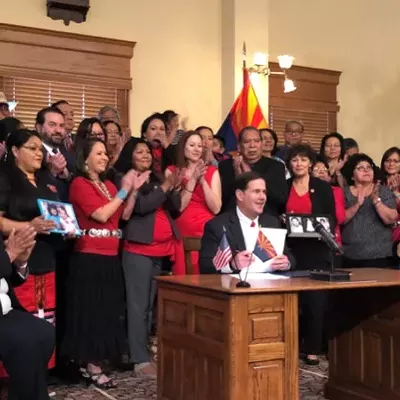After negotiations with Gov. Janet Napolitano reached an impasse earlier this month, Senate President Ken Bennett and House Speaker Jim Weiers were planning to resurrect the $8.2 billion budget the governor had vetoed back in March, agree expand to all-day kindergarten, provide some seed money for a proposed Phoenix med school, sweeten the pot with a few more of Napolitano's demands, and send the new package her way.
It sounded good on paper, but as the leadership attempted to bring the GOP caucus in line last week, a group of conservatives in both the House and Senate unexpectedly balked.
The rebels, led by Gilbert lawmakers Eddie Farnsworth in the House and Thayer Verschoor in the Senate, want to throw some bitter seasonings into the sausage. In exchange for all-day K, they want to get some form of vouchers (a voucher plan couldn't scrape together the votes to pass the House this year) and tax breaks for companies that fund scholarships to private schools, along with a handful of other demands.
The rebellion was similar to the way that moderates turned on the more-conservative House leadership last year, complete with secret meetings to plot the right moment to strike--which was pretty much when the appropriation committees were set to start meeting last Thursday, April 21.
But there's a key difference to last year's moderate revolution: Conservatives have no room to make a deal with Democrats to get a budget passed, so they can only slow the process.
Moderate Republicans could just reach out to Democrats and tell conservative rebels to get stuffed, but leadership promised at the beginning of the session that the legislative budget would have 31 GOP votes in the House and 16 GOP votes in the Senate.
The downside of dealing with Democrats: (1) The D's will demand even more spending, and (2) conservatives will accuse the moderates of being in bed with the Democrats during the next election cycle.
The upside of dealing with Democrats: It might be the only way out of the session. Napolitano is expected to see vouchers as a deal-breaker and veto the budget, starting the whole process all over again.
Napolitano has certainly not been shy about using her veto, with at least three dozen bills rejected this session. This week, she grabbed headlines by vetoing a bill that would have ended Arizona's ban on firearms in establishments that serve alcohol.
"Arizona's law enforcement organizations have consistently opposed this legislation, and their concerns have not been addressed by the sponsors of this bill," said Napolitano. "I am also sympathetic to the concerns of property owners, including the owners of bars and restaurants that would be adversely affected by this bill."
A survey earlier this year by Phoenix PBS affiliate KAET-TV showed that 78 percent of voters polled opposed the law.
Napolitano rejected at least 10 other bills on Friday and Monday, including:
· A bill that would have required the Citizens Clean Elections Commission to report the number of rules they establish on their Web site. Said Napolitano: "It is difficult for me to imagine that the Arizonans who voted for Clean Elections in 2000 would have wanted the Commission to spend public time counting such items as 'the number of pages of rules, policies or guidance documents adopted by the Commission, if those rules, policies or guidance documents were printed ... onto standardized paper.'"
· A bill that would have tightened property-tax limits for school districts;
· A bill that would have further limited spending on desegregation efforts in school districts;
· A bill that would have allowed universities and community colleges to sponsor charter schools;
· A bill that would have given the Legislature new auditing powers over state agencies.
· A bill that would have eliminated workers' compensation insurance for many taxi drivers; and,
· A bill that would have further restrictions on investigations of civil rights complaints by the Attorney General's Office.
In a victory for the Tucson Metropolitan Chamber of Commerce, which lobbied heavily for its passage, Napolitano signed a bill that seeks to limit testimony in medical malpractice suits.
But she signed it with reservations. Napolitano said she agreed with the portion of the bill that allows physicians and other med staff to offer apologies and condolences without worry about their statements being used against them in court.
Napolitano had concerns with another provision that limited expert-witness testimony in malpractice cases. Napolitano warned the provision might not survive a court challenge over whether it intrudes on judicial authority to set standards for expert witnesses.











